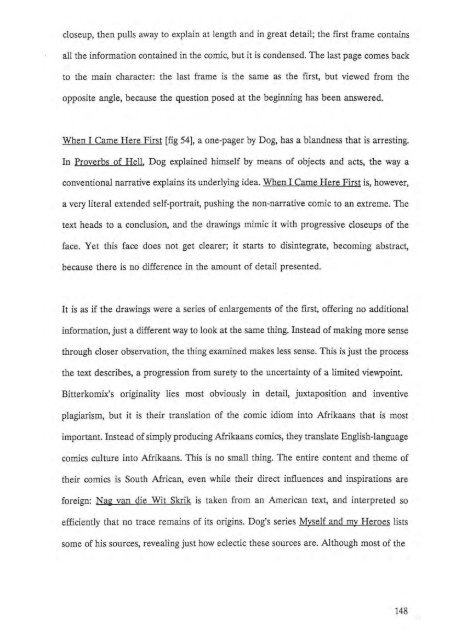Text - Rhodes University
Text - Rhodes University
Text - Rhodes University
Create successful ePaper yourself
Turn your PDF publications into a flip-book with our unique Google optimized e-Paper software.
closeup, then pulls away to explain at length and in great detail; the first frame contains<br />
all the information contained in the comic, but it is condensed. The last page comes back<br />
to the main character: the last frame is the same as the first, but viewed from the<br />
opposite angle, because the question posed at the beginning has been answered.<br />
When I Came Here First [fig 54], a one-pager by Dog, has a blandness that is arresting.<br />
In Proverbs of Hell, Dog explained himself by means of objects and acts, the way a<br />
conventional narrative explains its underlying idea. When I Came Here First is, however,<br />
a very literal extended self-portrait, pushing the non-narrative comic to an extreme. The<br />
text heads to a conclusion, and the drawings mimic it with progressive closeups of the<br />
face. Yet this face does not get clearer; it starts to disintegrate, becoming abstract,<br />
because there is no difference in the amount of detail presented.<br />
It is as if the drawings were a series of enlargements of the first, offering no additional<br />
information, just a different way to look at the same thing. Instead of making more sense<br />
through closer observation, the thing examined makes less sense. This is just the process<br />
the text describes, a progression from surety to the uncertainty of a limited viewpoint.<br />
Bitterkomix's originality lies most obviously in detail, juxtaposition and inventive<br />
plagiarism, but it is their translation of the comic idiom into Afrikaans that is most<br />
important. Instead of simply producing Afrikaans comics, they translate English-language<br />
comics culture into Afrikaans. This is no small thing. The entire content and theme of<br />
their comics is South African, even while their direct influences and inspirations are<br />
foreign: Nag van die Wit Skrik is taken from an American text, and interpreted so<br />
efficiently that no trace remains of its origins. Dog's series Myself and my Heroes lists<br />
some of his sources, revealing just how eclectic these sources are. Although most of the<br />
148
















